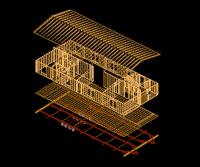Lighting is a crucial design element that directly
affects the performance of your staff. Lighting can add ambiance
to
your building by highlighting colors and textures.
A good lighting plan can make areas more versatile for varied tasks
and transform the way you use your building.
Your lights should be a transparent design element in your room.
Take advantage of the benefits offered by a simple
electronic lighting control system. The system works on timers
to control light levels, energy costs and enhance
building security.
About 15% of your electricity is used by your lights.
Properly planning the right combination of fixtures and sources
can improve energy efficiency and save you money.
Most people know that wattage is the amount of electricity used
by a bulb, but did you know that a lower-watt bulb
does not necessarily mean less brightness. A 20-watt compact
fluorescent bulb produces the same light as a standard
75-watt incandescent for about a quarter of the energy costs.
A table candle produces about 12 lumens. Lumens
measure the amount of light a bulb produces. A standard
60-watt incandescent bulb shines at 855 lumens.
Foot-candles measure the amount of light that reaches an object.
To ensure the proper lighting coverage, convert
your bulb wattage to foot-candles.
Voltage is the pressure of electrical power supplied
to light a source. You can determine your required amperage
by taking your total watts and divide by your voltage.
HVAC Systems
About 60% of your monthly electric bill will go
towards paying for heat and cooling. Add that to the 15%
mentioned above that is used for lighting and you
can see approximately 75% of your future monthly electric bill.
Proper planning before construction can save you
tens of thousands of dollars. Modular Building Associates can
assist you in making the right decisions.
We can recommend specifications that will save you money and keep
your business profitable for years to come.
Let's face it. The formula for a successful
business is bringing in more than you spend. Modular Building Associates
will assist you to maximize the dollars you spend
to ensure you get a return from your building investment. Make
no mistake about it, purchasing or leasing a modular
building is an investment. More so than any other form of
construction because the future resale value of
your building is a direct reflection of the specifications you choose in
the planning and design phase.
As a general rule of thumb, divide your overall
square footage by 275 to calculate the approximate tons of air
required to cool a building. This will put
you in the ballpark, but remember that a complete evaluation is required
to determine your heat/cool loss based upon your
building materials. Heat naturally flows from a warmer area to
a cooler space. This basic fact is why it
is so important to minimize the loss of heat and cooling by increasing
your
R-values and incorporate a vapor barrier into your
building specifications.
R-value refers to the thermal resistance of a material
to heat flow. In a typical stud wall with R-11 insulation, you
have heat loss between the studs, in voids without
insulation and the actual stud serves as a thermal short-circuit to
conduct heat. Your actual R-Value of the
wall is not equal to the insulation R-value because of the conductive nature
of the wall stud. Both wood and steel studs
conduct heat, but metal framing has a much greater thermal short-circuit.
As a matter of fact, a steel stud wall reduces
the R-value of the wall by as much as half the insulation's R-value.
Five physical attributes affect the thermal performance
of any wall system: 1) Whole wall R-value, 2) Thermal
mass,
3) Air tightness, 4) Moisture tolerance
and 5) Longevity. The whole wall R-value is a better criteria
then the
clear-wall and much better than the center-of-cavity
R-value methods used to compare most types of wall systems.
The value includes the effect of the wall interface
details used to connect the wall to other walls, windows, doors,
ceilings and foundations. Wall systems with
significant thermal mass have, depending on the climate, the potential
to reduce building annual heating and cooling energy
requirements below that of a standard wood frame construction
with similar steady-state R-value. Air leakage
and heat loss through wall assemblies can reach as high as 40% due
to infiltration. Quality workmanship and
proper specifications are the only safeguard to increase air tightness.
Moisture tolerance of a wall system is critical
to the long-lasting service life of a building. Moisture accumulation
is normal due to vapor diffusion and airflow, but
the key is having a wall that can dry itself out naturally. Longevity
of any wall system is directly impacted by a wide
variety of variables, but the most important element for long-lasting
service is normal maintenance.

